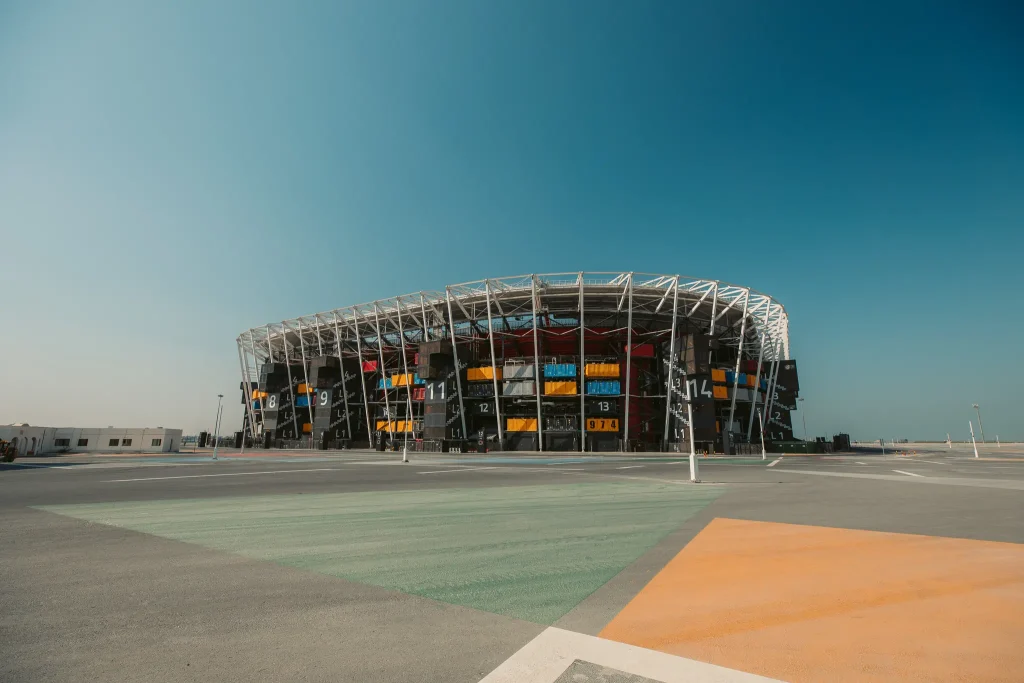
Qatar’s tourism industry will once again welcome thousands of football (or soccer) fans from around the world, as the FIFA Intercontinenal Cup 2024 concludes in Doha.
Brazilian and Mexican tourists are expected to be part of the first wave of visitors as Brazil’s Conmebol verses Mexico’s Pachuca on 11 December. Egyptians are expected to make up the bulk of the second wave of tourists, with the winning Latin American team entering the play-offs against Egypt’s Al Ahly on 14 December.
Both matches will be held at Doha’s 44,000-capacity Stadium 974 which – fun fact – was named after Qatar’s international dialling code (+974) and was designed by Fenwick Iribarren Architects with 974 recycled shipping containers as a homage to the site’s industrial history.
Spanish tourists will likely lead an influx of visitors for the finals against Real Madrid, which will take place on 18 December, at the 89,000-capacity Lusail Stadium, shining a tourism spotlight on Qatar’s second biggest city of Lusail.
While Qatar’s tourism and sporting industries are no doubt racing against the clock with final preparations, FIFA appears content with the State’s readiness.
During a recent week-long visit, a FIFA delegation described Qatar’s sporting infrastructure including Stadium 974 and Lusail Stadium, as world-class.
Roberto Grassi, FIFA’s Head of Youth Tournaments, was reported by Qatar News Agency as being complimentary towards the State’s organisational abilities, particularly in hosting football tournaments.
“Qatar has been able to build high-level capabilities and rich expertise in organising major sporting events, including the FIFA World Cup Qatar 2022, which has achieved impressive success on all levels,” he said. “The sustainable legacy of the global tournament is still apparent and seen in modern stadiums built according to the highest international standards and specifications.”
Also read: Top things to do and see on a 24-hour stopover in Qatar
The upside of hosting a major sporting event

Over the last few years, Qatar has positioned itself as being as top destination for sports tourism, particularly as a host destination for major international sporting events.
This year, the State has hosted 85 sports-related events ranging from the FIFA International Cup 2024 through to the Formula 1 Grand Prix 2024, which kicks off next week. This focus on sports tourism has contributed to the increase in visitation to Qatar which has had an incredible growth of 147% over the last five years.
Qatar was also recently recognised as a top destination for sports and tourism in the Qatar Economy Watch 2024 report by PwC Middle East. The report acknowledged the State’s investment in sporting infrastructure and marketing which has helped diversity and grow its economy.
“The nation’s commitment is evident with significant budget allocation to sports,” the report said.
Meraj Quriesh, Founder of 365 Adventures which operated in Qatar, Oman, the UAE and Saudi Arabia, concurred, saying Qatar’s approach to sports tourism has compelled travellers to visit and in turn, create new opportunity for local tourism businesses.
“More visitors mean more opportunities for businesses like ours,” he told Rihlat Travel News. “As the FIFA World Cup approached in Qatar, we at 365 Adventures, though not a big company, saw an opportunity to lead through collaboration.”
“We realised that if all tour operators followed a unified operational strategy, we could manage the influx more effectively. Instead of competing on uniqueness, we aligned our efforts with the industry to ensure seamless operations across the country.
“This collective approach allowed us to handle the complexities smoothly—and we’re proud to say it worked remarkably well.”
In addition to boosting its own reputation as a sporting destination, Qatar has helped raise the profile for other Middle Eastern destinations with an eye on the sector of tourism including Saudi Arabia and Morocco.
The downside of hosting a major sporting event
With every up, there’s somewhat of a down and in this case, it’s the potential impact of over tourism.
A study released earlier this year called ‘Impact of the 2022 FIFA World Cup on Qatar’ considered the good and bad of a small destination like Qatar hosting a major sporting event. The report took into account the positive brand or destination awareness and boost to economy while considering the potential disruption to locals and the likelihood of ‘superspreading’ events (given the World Cup took place two years after the height of the COVID-19 outbreak).
The great news!
Fortunately, people seem less concerned these days about COVID-19 (best to move on!) and Qatar thus far, hasn’t displayed or received negative reviews in relation to overtourism. And in terms of local disruption, the report found that in 2022, Qatar’s Gross Domestic Product grew long with the retail and hospitality sectors which brought about additional employment and investment opportunities.
Experiencing the rush of tourism firsthand, 365 Adventures’ Meraj acknowledge increased visitation and congestion as a major challenge and learning curve.
“It affects locals and tour operators, creating chaos for those not directly involved in the event,” he explained.
Meraj believes a way to overcome the chaos is to try to get organised ahead of the event, engage with organisers early and understand how the event will shape the State.
“Approach organisers early and run targeted ads during the event,” he suggested. “Visitors are looking for experiences—we need to be visible and ready.”
Taking advantage of major tourism and sporting events
In addition to collaborating and streamlining messaging, 365 Adventures’ Meraj suggested other tour operators take advantage of largescale events by finding their niche.
“Offering something distinct helps you stand out in the crowded tourism market during major events,” he explained.
Once the buzz dies down, Meraj said maintaining momentum is important to continued business. He said while it can be tough, it’s possible to keep generating high bookings post-event.
“Plan well in advance and treat last-minute bookings as bonuses,” he said. “Competition is fierce, so always be prepared.”
Also read: Sports tourism gains more momentum in MENA



